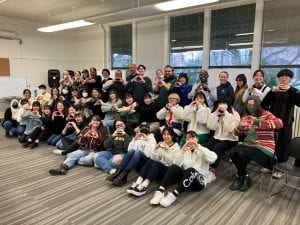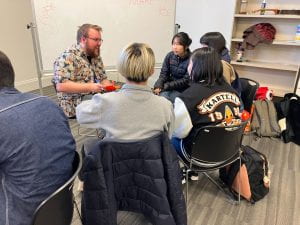Blog post by Emma Snyder, LTS student
The month is drawing to a close, and it’s time for another spotlight! This time we are looking at one of the teaching practicum opportunities for students in LTS. We turn our focus to the American English Institute (AEI), a provider of English language instruction to our university’s international students, as well as home to the “Talking with Ducks” class.
“Talking with Ducks” is a conversational elective for international English learners at the AEI that is collaboratively taught by some of the university’s “Ducks”: students in LTS MA program and the Second Language Acquisition and Teaching (SLAT) undergraduate certificate program. Supervised by LTS faculty Dr. Patricia Pashby, this class allows AEI students to practice speaking English with their peers while giving the LTS and SLAT students important time to practice developing classroom materials, leading lessons, and gaining comfort in front of a class. This program is a symbiotic relationship at its finest – wonderfully beneficial to both students seeking to practice their conversational skills and future educators seeking teaching experience.
Four of our current Ducks, LTS graduate students Aissa Canteras, Kaleb Stubbs, Nicolas Vassilenko, and Ryan Wozniak, were happy to share their experiences with the program.
What was your past teaching experience before Talking with Ducks?
Aissa: I was an English teacher in Japan. I taught novice learners, around three to seven years old.
Kaleb: I had teaching experience from interning with CASLS. I mainly had taught students that were from Japan and China
Nicolas: My past teaching experience came from participating in Talking with Ducks in my undergrad years, personal tutoring, and large-scale class assistance. This class has always had a special place in my heart for the genuine connection you make with the students and your peers.
Ryan: Before Talking with Ducks, I had tutoring positions at the University of Montana, and had spent about three years teaching English in Japan.
What first interested you in this class?
Aissa: I knew that I would get the chance to put into practice what I have been learning from my previous LT classes!
Kaleb: I wanted to expand on my teaching experience and be able to put ideas into practice. I also tutor at AEI so this was a great opportunity to become more familiar with students and teaching styles that work in the given context.
Nicolas: This sort of class should be implemented in every education-based major. It highlights the importance of collaboration and team building whilst having low-stakes real-world experience teaching. Because I had already taken the course in my undergrad – Linguistics – I did not need to retake it, but it showcases the superb quality of the course that I wanted to re-take it.
Ryan: I had previously thought about working on improving how to create better lesson plans and workshop ideas on what activities I could do in the classroom. This class also gave me the wonderful opportunity to meet new people (now especially being from a different state) and reconnect with the international community in Oregon.
How do you feel Talking with Ducks has benefitted your teaching? What is something that you will take forward into your future classes?
Aissa: With Talking with Ducks I got the chance to work in an entirely different language teaching context and so the experience has definitely broadened my perspective and knowledge about the field. I love how we were able to experiment on various activities and see what works in the classroom. One of my biggest takeaways from this class is the importance of being flexible – sometimes things don’t go as planned and so we need to be capable of making quick changes so we continue to provide the best learning experience for our students.
Kaleb: It was extremely beneficial to my teaching because it gave me the opportunity to develop lesson plans, work on my stage presence, become involved with the community, and to experience personal development and growth.
Nicolas: This experience has benefited my teaching in numerous ways. The main two that come to mind are adaptability and collaboration. Being able to adapt in education is a must because unpredictability can be the name of the game. Some lessons may not go over well – or in the best case, they’re so well-loved that students just want to interact with the activity. Collaboration, I feel, is the lifeblood of any successful lesson. TWD emphasized this by having weekly dry runs of the following week’s lessons to allow collaboration.
Ryan: I think this class has helped me understand that, depending on the type of classroom I will be teaching in and what we would be focusing on, I can finish this semester with the knowledge that I can work with different types of students and ensure that their needs are met when it comes to English.
And of course, what were some highlights of your time in the class? Any special moments that you’d like to share?
Aissa: Having the chance to collaborate with my peers is a highlight for me. I love how we got the chance to bounce off ideas every week and learn from one another!
Kaleb: There was something really special about being able to create an activity from scratch and see it come to life in action with people actually enjoying it. For example, the Food Fusion game, where students were able to create their own dishes, ended up being a successful and fun activity for everyone. I would love to be able to apply these activities that were done into future classes.
Nicolas: There are a plethora of gem moments during the TWD course, but the ones that stand out are the blips of time prior to students arriving. I always love the conversations between peers.
Ryan: I really enjoyed TWD Halloween edition, as it was fun to hear everyone’s plans for Halloween and it was amazing to see everyone communicate with each other more and be open and optimistic in the classroom.
The success of this collaboration has not only been felt by the Ducks leading it, but also the international students participating. Nearly every student enrolled at the AEI signed up for the elective this fall term, and many had perfect attendance. Conversation was vibrant and enthusiastic, as students grew in both skill and confidence. Talking with Ducks is a truly wonderful program, and a fantastic opportunity; for both those who would seek it as an international student or as an educator, we highly encourage you getting involved if you have the chance!





December 1, 2022 at 1:09 pm
This makes my heart so full! What a joy to see TWD back in person again and filled with so many interested and interesting faces. I am thrilled that you are all still finding it so useful. Rock on LTS and SLAT students and thanks, Patricia Pashby, for keeping the flame lit!